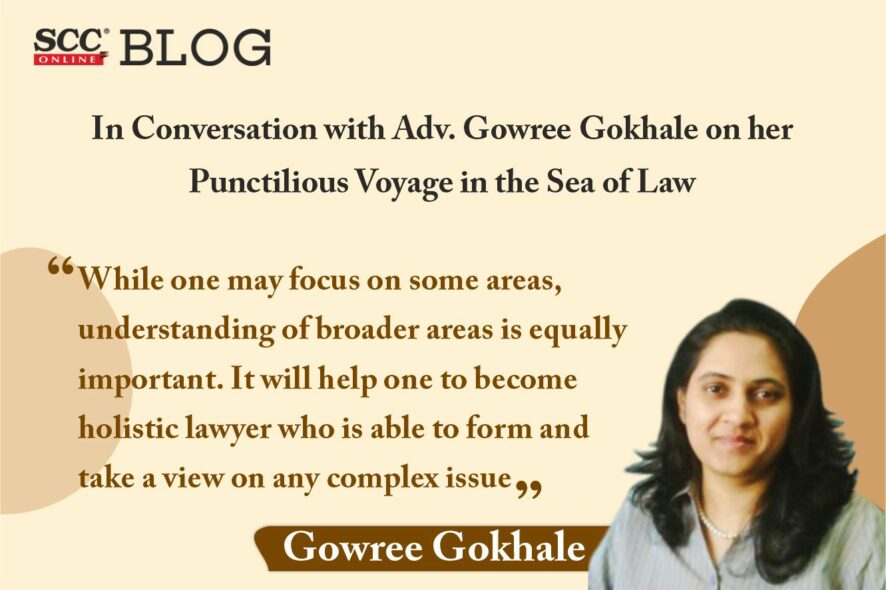Adv. Gowree Gokhale is a Senior Partner at Nishith Desai Associates for IP, IT, Media and Entertainment Law and Gaming Practice, Strategic Mergers and Acquisitions (M&As) and Cross-Border Disputes. Ms Gokhale regularly advices clients on IP management and protection strategy and has led several IP and technology related matters. She is also involved in devising IP litigations strategies for clients and has led several IP litigations before different forums in India. She has also assisted several international media production houses and pharmaceutical companies in structuring of their India operations, including IP structuring and advice on regulatory issues.
She is also a member of International Masters of Gaming Laws (IMGL). She is Co-chair of FICCI’s data protection and security committee. She has been a visiting faculty at the Institute of Intellectual Property Law Studies, Mumbai and Jindal Law School. She has also been named in the Hall of Fame (TMT) in Legal 500.
She has been interviewed by Ms Achintaya Soni, EBC/SCC Online Student Ambassador who is currently pursuing law from UILS, Panjab University, Chandigarh.
- What drew your curiosity to the field of media and entertainment law and how did you choose this field of expertise?
For first 6 years of my profession I was purely into IP litigation. When I joined Nishith Desai Associates due to my expertise in IP, I started focusing on this space. After the lead lawyer in media entertainment practice left the firm, the responsibility to take the practice forward fell upon me. I had to learn about the industry from the scratch. It was by accident and not design.
- How do you perceive the law school environment with regard to emphasising on niche areas of laws?
The law schools that are autonomous are better equipped to offer courses on niche areas. If credits are available students are additionally motivated to take such courses. The law schools that have to adopt university courses, have less flexibility in this regard. However, some still invite guest lecturers for the subjects.
However, now there is flexibility for students to take online courses from different universities, and obtain dual qualifications at the same time. This will enable students to learn niche areas from select universities.
- You have been a mentor and advisor at Zone Startups India [a joint venture between Ryerson University (Toronto) and Bombay Stock Exchange Institute (BSE)]. What is the one advice that you want the young generation to follow to bring social change?
Unfortunately, inter alia, due to sheer size of our country and population and for other reasons Government is not always able to implement schemes to satisfy basic human needs in the country. Startups, in addition to their revenue generating business, are equipped to partner with the Government in this regard. With innovative technologies including artificial intelligence, startups could assist the Government for policy making and implementation with impact investors willing to invest in such startups.
- Privacy and data protection laws have recently started gaining traction. However, you have been a part of this sphere for more than 20 years. What changes have you felt in the stance and what in your opinion is still to be done?
Earlier we relied upon common law principles and contractual arrangements. Post issuance of 2011 Rules with respect to sensitive data and information, under the Information Technology Act, I was involved in conducting workshops for the industry to create awareness. However, even after 11 years several enterprises in India have not implemented the said Rules. The proposed data protection law seems quite heavy. I suspect Indian enterprises that were not required to implement GDPR will struggle to comply with proposed law. Insofar as the data principals/subjects are concerned, the awareness levels have definitely increased. However, not many seem to be taking specific steps with respect to protection of their data.
- Law students and even lawyers early in their profession are told to choose a particular field and stick to it for the entire life. You have set an example as a solicitor as well as litigator. What would be your advice for the law students with regard to broadening of prospects?
On a lighter note, I would not have survived in this profession for so long, without the fun of handling wide range of issues on a daily basis. Monotony is boring. On a more serious note, matters have become complex. The world is not linear. While one may focus on some areas, understanding of broader areas is equally important. When I say broader areas I do not mean only legal subjects but also other humanity subjects, technology, etc. It will help one to become holistic lawyer who is able to form and take a view on any complex issue.
- Along with being a successful solicitor and litigator, you have also authored several research reports and articles on variety of intellectual property, pharmaceutical, media and technology laws across various national and international platforms. Not many people are familiar with the concept “exhaustion of a search”. What are your views on it?
Honestly, I mostly depend on juniors and interns for research. Though, instinctively, I can figure out whether the search is complete or not. Those who have broader thought process, have understanding of the Constitution and legal jurisprudence are better at research. It is not a mechanical “search term” based activity. In the earlier days we of course did not have the luxury of digital searches. Hence, one could not say that the research is complete. There always will be that element of the unknown. Now I mostly write on what the law ought to be, hence the research I carry out is mostly for broader thinking on the subject-matter.






